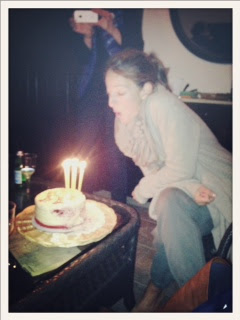Just when you thought El Jefe had abandoned her post. Take yourselves back in time, way back, to
early December. Fake snow on the front
porch, the aroma of rich winter cooking in the air, Christmas trees alight, and
avid readers drunk on champagne. It could
be none other than the twelfth annual holiday Book Club! Even better because
Blondie was all up in the hizzy! Once in
BC, always…
Thanks to The Highlander and Mr. Matty once again for
hosting. Seems like just yesterday there
were a million calories worth of artichoke dip and cured meats set forth before
us, to be followed by beef bourguignon (new recipe—a winner!) ladled over
truffled mashed potatoes (it’s always early January before El Jefe recovers
from potato mashing carpal tunnel syndrome), roasted brussel sprouts,
non-under-saladed salad (a bounty in fact!), crusty baguettes and Heath Bar
cookies galore. Deee lishy! All El Jefe
wants for Christmas is to never stray from that menu. And the other thing El Jefe wants is for
Carmen not to take ALL the leftovers home. Ever. Again.
Our December book, The Dinner, by Herman Koch, is an
international best-seller but did not fly off the shelves among our group. It came in at a lackluster 6.7. To refresh
our collective memories, this was the story of two families living in
Amsterdam: Paul, an ex-schoolteacher (dishonorably
discharged as we later discover), his wife Claire, and their son; and Paul’s
brother Serge, Dutch presidential hopeful, his wife Babette, and their two
sons, one adopted from Africa. The
children of these two families commit a heinous crime when they set a homeless
person on fire inside an ATM booth, and the story deals with the parents’
discovery of this incident and the ensuing consequences—all recounted during
the course of a dinner at one of Amsterdam’s hottest restaurants. Despite the
violence and psychological twists in this book, several people commented that it
was a slow read: long stretches between
inflection points, disjointed chapters flipping back and forth in time, and a pace
that just generally dragged. As a
counterpoint, it was noted that the pace of the book was deliberately measured
in order to match the theme and setting, that is, it took place over multiple
courses of an elegant meal rather than being served up in one shot like fast
food. The Dinner also was
criticized for not having a single likeable character and for the fact that
Paul, the protagonist, did not wrestle with the moral issues in the story at
all. On the other hand, the author clearly intended the readers to grapple with
the significant moral questions presented, and we went around the room and
talked about what we each would have done if our own child had committed the
crime but had not been apprehended.
Would we keep silent and hope the authorities never figured it out? Or would we turn our kids’ asses in? In
addition, the book was highly successful in its stunning 180 degree flip of the
reader’s expectations as to which family was “normal” and “happy.” The book is narrated by Paul, and at the outset
he depicts himself and Claire as the upstanding couple and casts doubt over
Serge and Babette. Most of us really
enjoyed the way Paul’s utter depravity was developed little by little—his
uncontrolled episodes of remorseless violence brought on by some unidentified (and,
according to The Doctor, fictional) genetic flaw—and then of all things Claire
turned out to be a total psychopath, instructing her own son to kill his cousin
and slashing Serge’s face to pieces with the stem of a broken wine glass so the
truth wouldn’t come out. Dang! Finally, because of the fact that Paul turns out
to be so cray-cray, he is an unreliable narrator and the reader is left
questioning whether there are parts of the story that never even happened at all. In sum, better than last year’s book on magic tricks but a far cry from Zeitoun.
Who needs dinner in Amsterdam? Just snacks when you get the munchies.
Deceptively peaceful.
Cate Blanchett will make her directorial debut adapting The Dinner-- easy, Claire.

















































